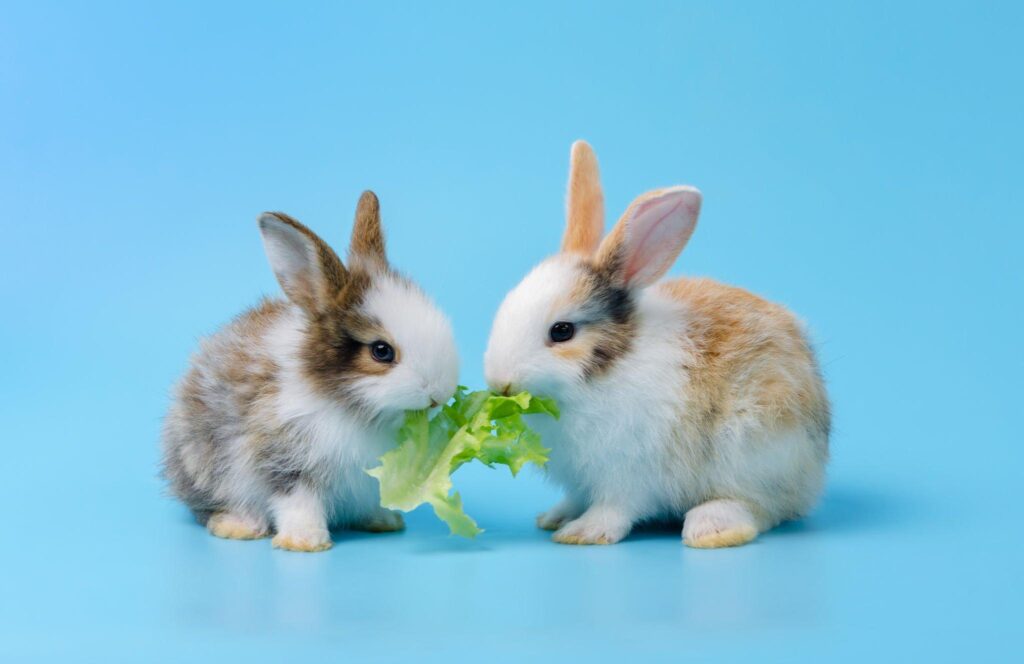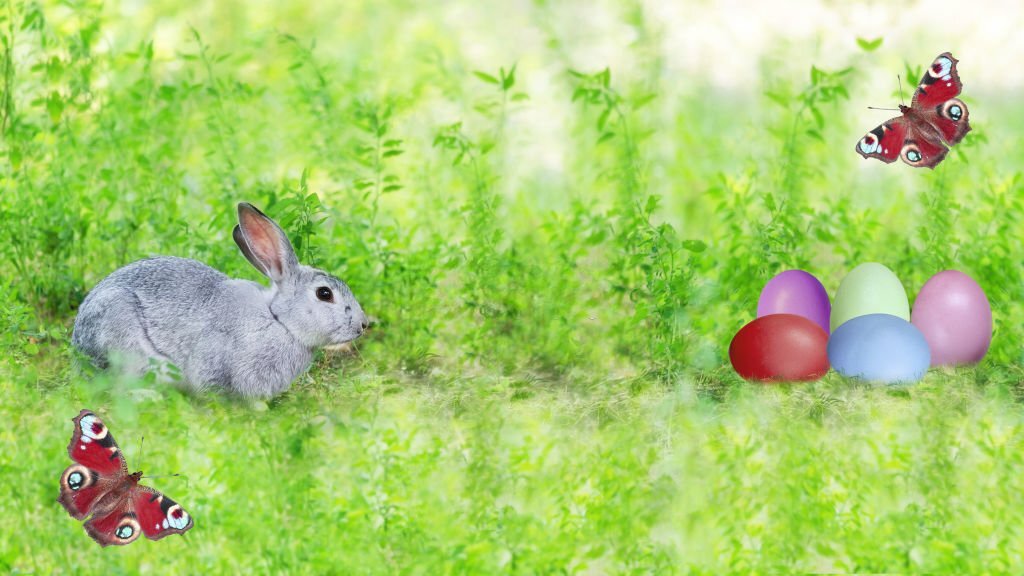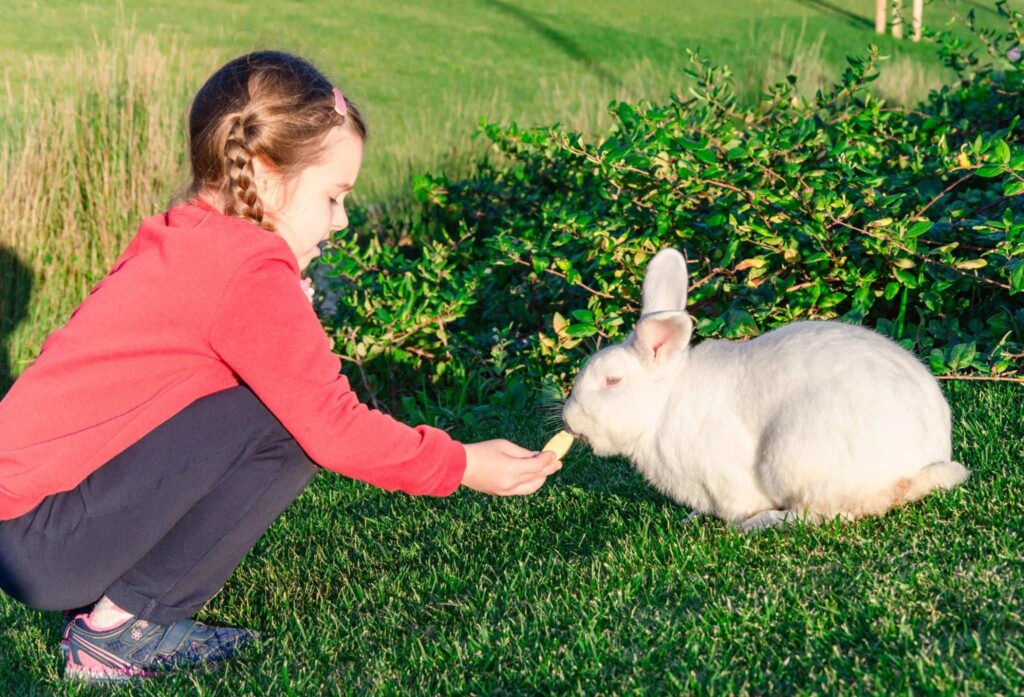Rabbits can attract a number of insects and bugs to their environment, which may cause concern for attentive rabbit owners. Flies, ants, earwigs, beetles, and even spiders may find their way to your rabbit’s hutch, drawn in by things like food debris, damp fur, and hiding spots. While most of these insects pose minimal risk, some can irritate, bite, or spread dangerous parasites to pet rabbits if left unchecked.
The good news is that there are steps rabbit owners can take to deter and eliminate these uninvited guests. This includes maintaining clean, dry hutches, removing food at night, sealing entry points, and using insecticides cautiously when needed. With proper sanitation and prevention, rabbits can stay pest-free and healthy.

This article will cover the following topics:
- Common insects attracted to rabbits and why
- Preventing fly infestations and deadly flystrike
- Keeping ants from invading rabbit hutches
- Earwigs, beetles, and other bugs drawn to rabbits
- Can spiders actually harm rabbits?
- Tips for protecting rabbits from insects
- Which insects can rabbits safely eat?
- Are spiders okay for rabbits to consume?
- Maintaining an insect-free rabbit environment
By understanding what draws insects to their rabbit’s habitat, owners can take the right steps to deter them. Monitoring your rabbit’s environment and health is also important to identify any insect issues early. With a few preventative measures, rabbits and their owners can hop along bug-free.
What Insects and Bugs Are Drawn to Rabbits?
There are a few common insects and bugs that may find their way to your rabbit’s hutch and environment. Here are some of the main culprits and what attracts them:
Flies
Flies are often the biggest nuisance. They are drawn to the smell of urine-soaked bedding, damp fur from sitting in urine, and bits of rabbit food or feces. Flies will lay eggs on soiled fur or bedding, which can hatch into maggots and lead to the potentially deadly condition myiasis, more commonly known as flystrike.
Ants
Ants can also become a problem. They are attracted to any rabbit food debris left in the hutch, as well as the sweet smell of rabbit urine. Some ants may bite or sting rabbits, causing irritation or stress.
Earwigs, Beetles, and Other Bugs
Insects like earwigs and beetles are attracted to the dark, hidden spaces in rabbit hutches as well as rabbit food. They can nibble on rabbit skin, ears, or hair, causing discomfort.
Spiders
While not directly drawn to rabbits, spiders may find their way into hutches while following other insects spiders prey upon, like flies and mosquitoes. Most outdoor spiders pose minimal risk to rabbits if bitten.
By understanding why these insects target rabbit environments, owners can take steps to remove their attraction and access.
Why Do Rabbits Attract Flies?

There are a few reasons that rabbits seem to attract flies:
- Wet urine – Rabbit urine is high in ammonia. When a rabbit urinates in its hutch or living space, the urine soaks into the bedding and fur. The ammonia smell attracts flies once the urine grows bacteria.
- Damp fur – When rabbits sit in urine-soaked areas, their fur becomes damp. This provides an ideal place for flies to lay eggs that can hatch into maggots.
- Food and feces – Bits of rabbit food, droppings, and cecotropes that get scattered in the hutch also draw in flies. These provide protein sources for adult flies.
- Fly eggs and maggots – The biggest risk is from fly eggs and maggots. Flies are attracted to damp, soiled areas and lay eggs in fur, bedding, and litter. The eggs hatch into maggots that feed on the rabbit’s tissue. This can lead to a deadly condition called flystrike.
To prevent flies around rabbits, it’s important to keep hutches clean and dry, removing wet bedding frequently. Droppings and uneaten food should also be cleaned up daily. Check your rabbit’s coat and skin daily for any fly eggs or maggot infestation. Tackling sanitation is key to preventing fly problems.
Do Rabbits Attract Ants?
Ants can also become an issue around rabbit hutches. There are a couple reasons ants may congregate in a rabbit’s environment:
- Food debris – Ants are attracted to any bits of rabbit food, droppings, or urine-soaked bedding that contains nutrients. They forage for food particles.
- Urine – Some ants are drawn to the sweet, sugary smell of rabbit urine. The ammonia in urine provides salts that ants seek out.
- Water – Ants need water to survive, so leaks, dripping bottles, or standing water from cleaning can draw them in.
While ants themselves don’t pose a major threat, they can bite or sting rabbits which may cause stress or irritation. No one wants ants crawling on their pet!
To deter ants, be sure to remove any uneaten rabbit food at night to eliminate a food source. Use ceramic food bowls that discourage ants. Clean litter boxes frequently to dispose of droppings, and absorb urine in bedding promptly. Fix any leaks, and try using ant baits or traps if ants persist. Keeping the hutch environment clean and dry is key.
What Bugs Are Drawn to Rabbits?
In addition to flies and ants, certain other crawling or flying bugs can find their way to your rabbit’s habitat:
Earwigs
Earwigs are attracted to the dark, moist environment inside rabbit hutches. They also feed on rabbit food such as hay and pellets. Earwigs use their pincer to explore and nibble, which may irritate your rabbit’s skin.
Beetles
Beetles like to hide in the small spaces in a hutch. They feed on decaying wood and vegetation, so rabbit food and waste attracts them. Some beetles will snack on materials like hair and skin, annoying rabbits.
Crickets/Grasshoppers
These jumping insects are protein-seekers drawn to rabbit food. They are generally harmless but the noise may startle rabbits. Ensure they don’t contaminate food.
Maggots
Fly maggots arrive if flies are able to lay eggs in your rabbit’s environment. They can lead to deadly flystrike infections. Monitor for fly eggs and treat any maggots immediately.
To discourage these hitchhiking bugs, eliminate food overnight, seal up hiding spots, and use insecticides cautiously if infestations occur. Removing their shelter and food sources will help protect your rabbits.
Do Rabbits Attract Spiders?
Many owners wonder if spiders can harm rabbits. In most cases, spiders are not directly drawn to rabbits themselves. However, spiders may find their way into rabbit hutches for a couple reasons:
- Prey – Spiders follow other insects like flies, mosquitoes, and moths which they eat. If these insects make their way into a hutch, spiders may follow. Their prey is what attracts them.
- Shelter – Spider webs are often built in secluded, covered locations. The small dark spaces in rabbit hutches can provide nice spots for web-building.
While startling, most outdoor spiders pose a low risk to rabbits if bitten. Only a few spider species have venom potent enough to cause anything beyond a minor irritation or reaction.
However, spider bites should still be avoided. Webs are also a nuisance and can trap rabbits if extensive. Here are some tips to discourage spiders from setting up camp:
- Remove insect and fly habitat like food waste
- Use insecticides to eliminate their prey
- Seal entry points to prevent access
- Clear webs frequently with gloves
- Check for entry holes or cracks to seal
By discouraging other insects and maintaining clean hutches, rabbits and owners can coexist with spiders peacefully. Monitoring for webs and sealing access points are key prevention steps.
Protecting Rabbits From Insects and Bugs
Keeping rabbits pest-free requires dedicating attention to their environment. Here are some tips to deter insects and bugs:
- Clean hutches frequently – Spot clean daily and fully disinfect weekly. Remove soiled bedding, droppings, and uneaten food promptly.
- Eliminate standing water – Fix any leaky bottles. Don’t allow water to pool from cleaning.
- Remove food at night – Don’t leave pellets or vegetables overnight to avoid attracting ants and flies.
- Use food bowls – Ceramic bowls prevent food scattering that attracts insects.
- Clean litter boxes often – Scoop urine-soaked litter frequently to avoid ammonia buildup.
- Check for fly eggs/maggots – Look at fur and skin for any fly eggs or maggot infestations daily.
- Apply insecticides carefully – Use natural sprays made for rabbits if ants or flies persist. Avoid aerosols.
- Ensure good ventilation – Allow air flow to prevent a humid environment.
- Seal entry points – Use wire mesh to seal gaps and holes that allow access.
By taking these preventative steps and monitoring your rabbit’s environment closely, you can help protect them from pesky insects and enjoy a bug-free bond with your bunny.
Can Rabbits Eat Insects?
While we want to keep most insects away from rabbits, some bugs can actually be a healthy treat in moderation. Rabbits are opportunistic eaters, and insects provide protein, fat, vitamins and minerals. Some good insect options include:

- Mealworms – High in protein, fiber, and micronutrients like vitamin B12. A favorite rabbit treat!
- Crickets – Also packed with protein. Gut load crickets to boost nutrition.
- Grasshoppers – Contain protein and nutrients similar to crickets.
- Caterpillars – Soft bodies are easy to digest. Contain healthy fats.
- Maggots – Must be boiled first. Provide protein.
- Beetles – Crunchy texture provides enrichment.
- Snails – Calcium-rich shells support teeth and bones.
When feeding insects, there are some important tips to follow:
- Always supervise your rabbit to prevent choking on hard shells or overeating.
- Introduce new insects slowly in small amounts.
- Buy commercially raised insect products made for pet food. Avoid wild insects that may carry parasites or pesticides.
- Variety is important, so rotate different insects.
In moderation, certain insects can be a beneficial treat that provides stimulation and nutrition. With proper precautions, rabbits can reap the rewards of insect consumption.
Safe vs Harmful Insects for Rabbits
Not all insects are created equal when it comes to rabbits. Here is a breakdown of safer insect options versus ones to avoid:
Safe Insects
- Mealworms
- Crickets
- Grasshoppers
- Earthworms
- Caterpillars
- Fly larvae/maggots
- Beetles
- Snails (calcium source)
These insects are nutritious, easily digestible, and low risk if fed properly.
Harmful Insects
- Spiders
- Mosquitos
- Houseflies
- Firebrats
- Earwigs
- Ants
These insects can bite, sting, spread disease, or contain toxins. They are best avoided.
Tips for Feeding Insects
When offering insect treats, follow these tips:
- Buy from reputable commercial sources
- Feed only healthy adult insects
- Gut load feeder insects for added nutrition
- Supervise to prevent overeating
- Limit to a few times per week
- Introduce new insects slowly
- Chop larger insects into pieces
- Avoid wild insects
With proper precautions, occasional insect treats can provide nutrition and enrichment. But never offer insects known to be toxic or bite.
Can Rabbits Eat Spiders?
What about feeding spiders to rabbits? This is not recommended for a few key reasons:
- Bites – Though rare, some spiders can deliver mildly venomous bites if consumed alive. This poses unnecessary risk.
- Exoskeletons – The hard, crunchy shells of spiders are difficult for rabbits to digest, which may cause intestinal blockages.
- Parasites – Wild spiders may harbor parasites like tapeworms that can be passed to rabbits.
- Low Nutrition – Spiders don’t provide much beneficial nutrition compared to insects like crickets or worms.
- Small Size – Tiny spiders are easy to choke on and may not be fully chewed.
While most spiders are not directly harmful if ingested, there are better options for protein and nutrients. Stick to soft-bodied insects that are easier to digest. Crickets, mealworms, and caterpillars are healthier choices.
The risks of feeding spiders typically outweigh any benefits. Supervise your rabbit closely outdoors where spiders may lurk in vegetation. Though spidey snacks are not recommended, they should not cause major issues if accidentally consumed in small amounts.
Keeping Rabbits Insect-Free
While the occasional supervised insect treat can be beneficial, rabbits will be happiest in a pest-free environment. Here are some tips to maintain an insect-free zone:
- Clean hutches thoroughly each week – sweep, scrub, and disinfect all surfaces.
- Remove soiled bedding, droppings, and uneaten food daily. Take out the trash!
- Use a natural rabbit-safe insecticide spray if ants, flies, or spiders persist. Reapply after cleaning.
- Look for and seal any holes, cracks or gaps that allow insects to enter.
- Install wire mesh over windows, vents, and hutches to prevent access.
- Address any standing water issues or leaks that allow breeding.
- Never allow damp bedding or soiled fur to remain in contact with your rabbit’s skin.
- Check your rabbit’s coat, ears, eyes, and skin daily for any signs of insects, eggs, or insect-related irritation.
- Contact your vet if you notice any maggots, egg casings, wounds, or skin issues.
By maintaining proper sanitation and sealing access, rabbits can happily and safely live insect-free. With vigilance and prevention, you can help protect your pet from pest problems.
FAQ
Q: What scents attract flies to rabbit hutches?
A: Flies are attracted to the smell of ammonia from urine, vinegar-like scent of cecotropes, and protein odors from scattered food or feces. Keeping hutches clean and dry eliminates these attractants.
Q: Will ants hurt my rabbit if they get in the hutch?
A: Most ants pose minimal risk, but may bite or sting which can irritate skin. Prevent ants by cleaning food debris and using natural repellents. Seek vet care if stings cause swelling or abscess.
Q: Why do spiders spin webs in my rabbit’s hutch?
A: Spiders build webs in secluded areas to catch prey and shelter their eggs. The small dark spaces in hutches suit their needs. Clear webs regularly and seal cracks to prevent access.
Q: How often should I check my rabbit for fly eggs or maggots?
A: Check your rabbit’s coat, ears, bottom, eyes, and skin daily for any signs of fly eggs or maggot infestations which can lead to deadly flystrike. Catching them early is critical.
Q: Can wild insects make my rabbit sick?
A: Wild insects may carry parasites, bacteria, or have pesticide contamination. Only offer commercially raised feeder insects to avoid intestinal issues or toxicity.
Related Post
Animal Suicide – The Shocking Truth Pet Owners Need to Know